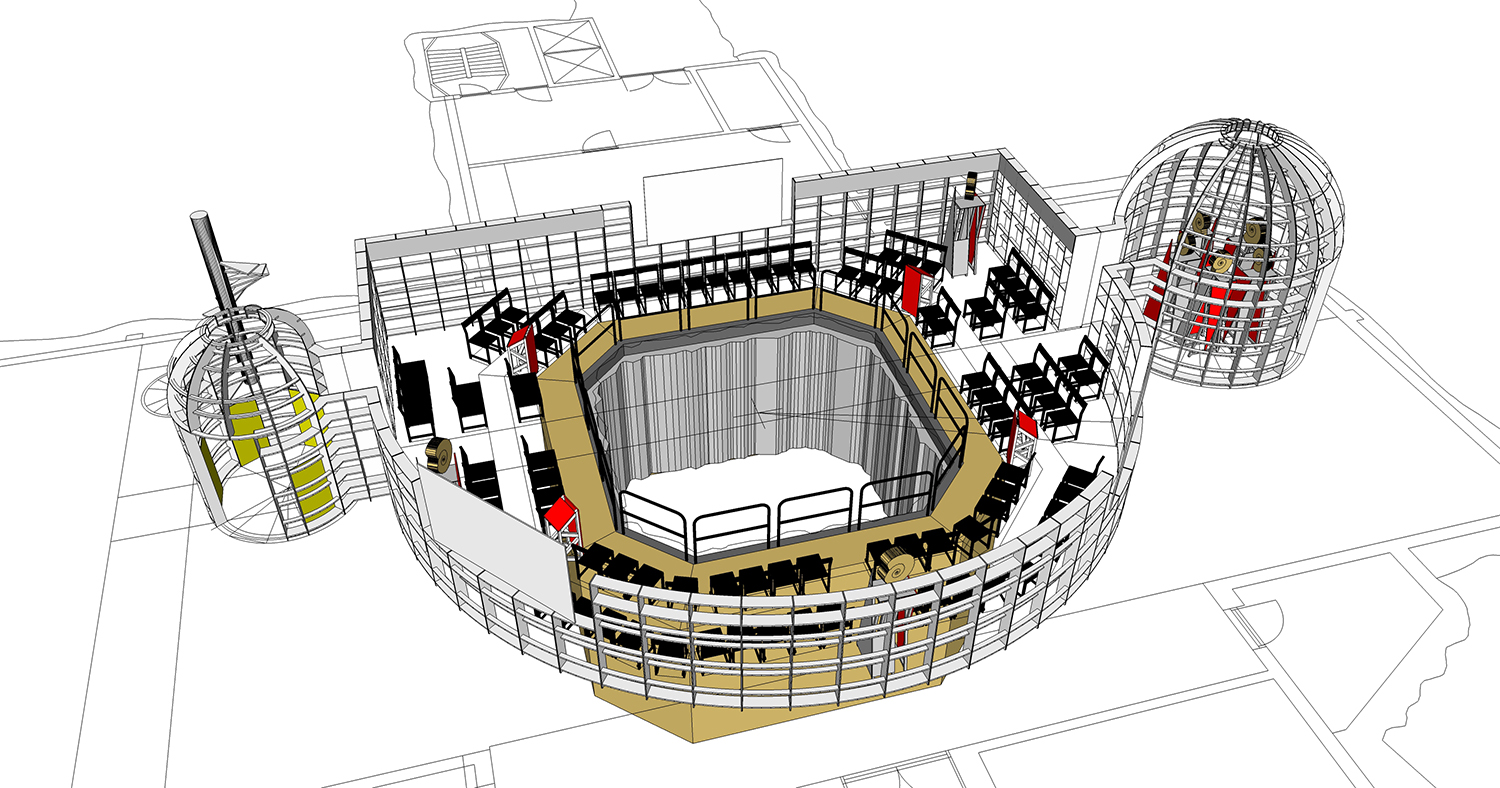Interplanetary Species Society Assembly will take place 25 meters below ground in Reaktorhallen in Stockholm in an installation developed by artist Jonas Staal that proposes an alternative politicized biosphere.

Detta evenemang är fullbokat.
With organizations such as Space X pushing to colonize Mars in the next decade, corporations planning to terraform planets as a back-up for the billionaire class to flee from planetary climate catastrophe, and the Trump administration announcing to export nationalism to space through its “Space Army,” we are witnessing the emergence of an authoritarian and corporatist intergalactic order.
Interplanetary Species Society instead demands a sustainable earth, before any interplanetary engagements can take place. The equality of planetary life must be the foundation for the future of interplanetary life, and new extraplanetary perspectives must go hand in hand with the deepening of intra-planetary understanding. ISS further rejects terms such as “space colonization” and calls for interplanetary cooperation instead, in which humans learn to understand themselves not as “pioneers” but as guests.
During the founding assembly of the ISS, various speakers from the field of art, architecture, design, theory and science, will gather to discuss and propose alternative conditions for our becoming interplanetary species, from interplanetary infrastructures to our linguistic engagements with non-human subjectivities and visions of emancipatory cosmic governance.
The assembly will take place in an installation developed by artist Jonas Staal that proposes an alternative politicized biosphere in which humans, ammonites, proletarian plantae and meteorites gather, as an imaginative infrastructure for our becoming interplanetary species. Situated twenty-five meters underground in Reaktorhallen in Stockholm, which used to house the first nuclear research facility of Sweden, the congress literally turns into our planet to reflect on what our future as an interplanetary species could and should be.
With contributions by: James Bridle, Kristine Dannenberg, iLiana Fokianaki, Vincent W.J. van Gerven Oei, Janna Holmstedt, Klaas Kuitenbrouwer, Charl Landvreugd, Aurélie Nyirabikali Lierman, Sven Lütticken, Felicity Scott och Anton Vidokle.
PROGRAMME AUGUST 24
11.00–11.15 Charl Landvreugd, Atlantic Transformerz – Dakar The performance, video and photo series by artist and researcher
Charl Landvreugd titled Transformerz, explores the relationship between earth-situated rituals and know-ledges, technology and transhumanism, and the legacies and various hues of blackness of Pan-Africanism and Afro- Europeanism. Bodies of culture both ancient and speculative appear between sea- and skyscape, articulating new identi-tarian formations and possibilities of belonging otherwise.
11.15—11.25 Welcome by Edi Muka, curator
11.25—11.45 Introduction by Jonas Staal, artist
11.45—12.15 iLiana Fokianaki, curator, in conversation with Charl Landvreugd, artist and researcher
12.15—13.00 Lunch
13.00—15.00 INFRASTRUCTURE: Becoming Interplanetary Species
Becoming interplanetary species was imagined throughout the past century in various forms. From Alexander Bogdanov’s Red Star (1908) in which Mars is an already realized commun-ist utopia, to the techno-survivalist infrastructures of Space X in our present. With our turn to neoliberal and authoritarian doctrines on earth, our visions of interplanetary infrastructure are hijacked by extractivist and corporate interests. How to re-politicize the infrastructures of our interplanetary future?
13.00—13.10 Introduction by moderator Klaas Kuitenbrouwer, researcher digital culture
13.10—13.35 Lecture Felicity Scott, architecture theorist
13.35—14.00 Lecture Sven Lütticken, art historian
14.00—14.15 Response by Kristine Dannenberg, Swedish National Space Agency
14.15—15.00 Conversation and audience propositions
15.00—15.15 Break
15.15—15.45 Anton Vidokle, Citizens of the Cosmos
Anton Vidokle’s film trilogy Immortality for All (2014—2017) and his new Citizens of the Cosmos (2019), contemporanizes an exceptional heritage of the Russian Revolution: the emergence of Cosmist sciences and arts. Cosmism argued for the resurrection of the dead, initiated new sciences that traced the relation between interplanetary choreographies and planetary human behavior, and opened pathways to imagine and establish cosmic citizenship.
15.45—16.15 Conversation between Anton Vidokle, artist, and iLiana Fokianaki, curator
16.15—16.30 Break
16.30—18.30 LANGUAGE: Dialoguing with the More-Than-Human
The current language of extraplanetarism shamelessly reproduces imperialist and colonial heritage. The claim of Mars as a “dead planet” has removed any boundary to consider the planet’s own history and subjectivity, copying the disastrous planetary politics in which ancient icecaps and other earth formations are treated as lifeless consumer property. What languages will make us susceptible for non-human, other-than-human and more-than-human subjectivities, both on earth and beyond?
16:30—16:40 Introduction moderator Vincent W.J. van Gerven Oei, philologist
16:40—17:00 Presentation Aurélie Nyirabikali Lierman, radioartist, vocalist and composer
17:00—17:20 Presentation James Bridle, artist and writer
17:20—17:40 Presentation Janna Holmstedt, artist
17:40—18:20 Conversation and audience propositions
18:20—18:30 Closing remarks by Edi Muka, curator, and Jonas Staal, artist.
SS is a project by Jonas Staal.
Installation: Jonas Staal in collaboration with architect Paul Kuipers and designer Remco van Bladel.
Production: Younes Bouadi and Evelien Scheltinga (Studio Jonas Staal), in collaboration with the Public Art Agency Sweden and the KTH Royal Institute of Technology.
With support from: Mondriaan Fund
The registration is closed. You are welcome to attend without pre-registration but seating is not guaranteed. The doors open at 10.30.